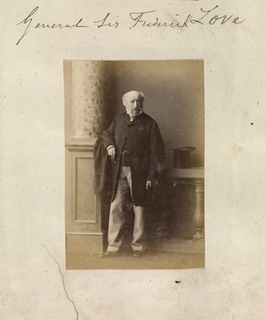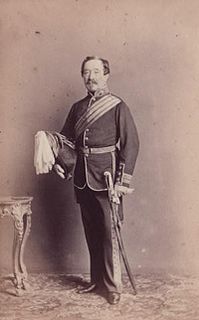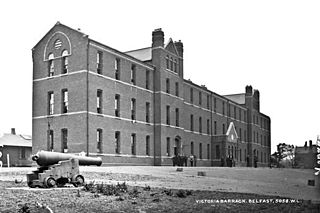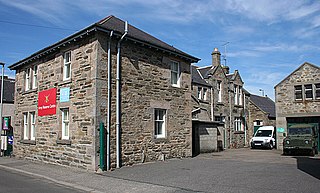The 96th Regiment of Foot was a British Army regiment, raised in 1798. Under the Childers reforms it amalgamated with the 63rd Regiment of Foot to form the Manchester Regiment.
The 102nd Regiment of Foot was a regiment of the British Army raised by the Honourable East India Company in 1742. It transferred to the command of the British Army in 1862. Under the Childers Reforms it amalgamated with the 103rd Regiment of Foot in 1881 to form the Royal Dublin Fusiliers.
The National Film Award for Best Direction is an honour presented annually at India's National Film Awards ceremony by the Directorate of Film Festivals (DFF), an organisation set up by the Indian Ministry of Information and Broadcasting. Since 1967, the award is given by a national panel appointed annually by the DFF to a director for their work within Indian cinema. It is presented by the president of India at a ceremony held in New Delhi.
William George Harris, 2nd Baron Harris KCH was a British soldier and peer.
The 109th Regiment of Foot was an infantry regiment of the British Army from 1862 to 1881, when it was amalgamated into The Prince of Wales's Leinster Regiment.

General Sir James Frederick Love was a British Army officer who served as Lieutenant Governor of Jersey.

Devoy Barracks was a military installation in Naas, County Kildare in Ireland.

General Freeman Murray CB was a British Army officer who became General Officer Commanding Eastern District.

Victoria Barracks was a military installation in New Lodge, Belfast in Northern Ireland.
General the Hon. Edward Finch was a British Army general and a member of parliament.
Major-General William Crosbie was a British Army officer.
The 103rd Regiment of Foot was formed as the 9th Garrison Battalion in November 1806. It became the 103rd Regiment of Foot in 1808. In 1809 the 9th garrison battalion, was transferred to the 103rd Regiment.
The 94th Regiment of Foot was a British Army regiment formed in England in October 1780. It was placed on garrison duty in Jamaica in 1781 during the Anglo-Spanish War and then returned to England. Captain David Alexander Grant of the 94th Regiment married Marie-Charles-Joseph Le Mote de Longeuil in 1781 and their eldest son became the fifth Baron de Longueuil in 1841. The regiment was disbanded in England in 1783.
The 94th Regiment of Foot was a British Army regiment formed in Wales in January 1760. It saw action in North America later in the year during the French and Indian War and then took part, alongside the Royal Marines, in the Capture of Belle Île in April 1761 during the Seven Years' War, before sailing for the West Indies later in the year. In the West Indies it took part in the Invasion of Dominica in June 1761. The invasion was led by Lord Rollo who had been appointed by Lord Amherst to take command. The regiment went on to take part in the Invasion of Martinique in January 1762. It was disbanded in 1763.
The 103rd Regiment of Foot was a British Army regiment raised in Bristol in May 1794. The regiment was raised by Lieutenant-Colonel William Dyott. Initially known as the Loyal Bristol Regiment, it was renumbered as the 103rd Regiment of Foot later that year but disbanded the following year when personnel were transferred to the 4th Regiment of Foot and the 7th Regiment of Foot.
The 103rd Regiment of Foot was a British Army regiment formed at Bury St Edmunds in October 1760. It took part, alongside the Royal Marines, in the Capture of Belle Île in April 1761 during the Seven Years' War. It was then disbanded in England in 1763.

The Union Street drill hall is a military installation in Keith, Scotland.
General William Cartwright was a senior British Army officer.




